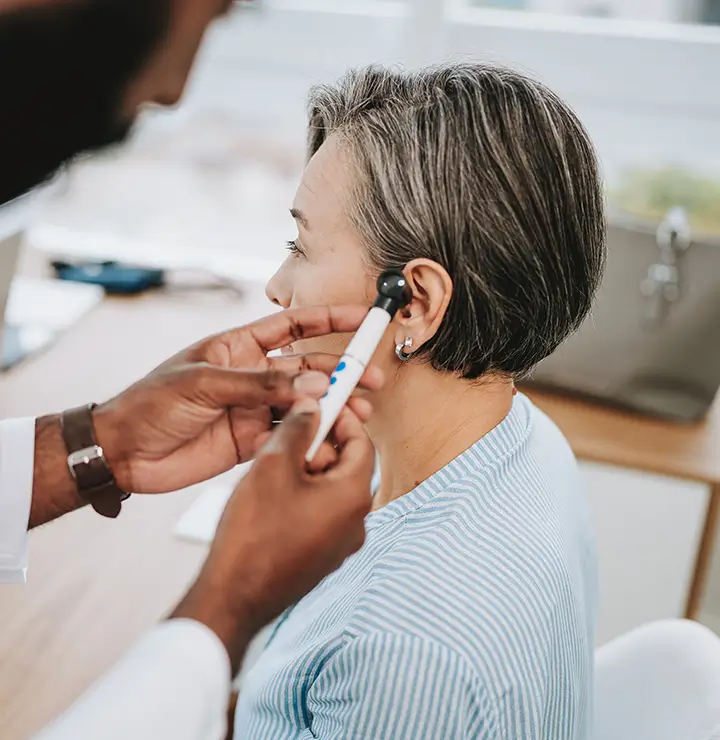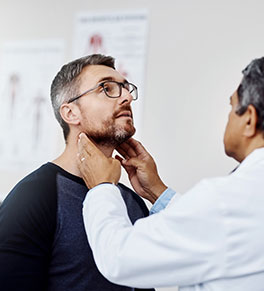Meniere's Disease
Meniere's disease is a disorder characterized by dizziness, hearing loss and a full feeling in the ears. The condition is a chronic one, but there are treatments available to help minimize the long-term impact of the disease.
Symptoms
There are four main symptoms associated with meniere's disease.
These are:
- Episodic vertigo (spinning dizziness)
- Tinnitus (roaring or ringing in the ears [usually just one ear])
- Fluctuating hearing loss
- Pressure sensation in the ear
An episode of Meniere's usually starts with a pressure sensation in the ear with increasing roaring sound in the ear, hearing loss and a sudden attack of vertigo.
The vertigo generally lasts at least 30 minutes and may last up to 24 hours or longer. Once the vertigo stops, the patients generally experience some imbalance which takes days or weeks to resolve.
The hearing generally returns, but over time, the hearing and balance function are lost with each attack of the vertigo. Some patients may just have fluctuating hearing loss without vertigo or episodic vertigo without hearing loss.
These are termed cochlear hydrops and vestibular hydrops respectively.
Causes
The causes of Meniere's disease isn't known, though there are several theories. One is that it is caused by an abnormal amount of fluid in the inner ears.
Things that might affect the fluid include:
- Improper fluid drainage
- Allergies
- Viruses
- Genetics
- Migraine headaches
- Head trauma
- Abnormal immune response
There are some known triggers of a Meniere's attack, which include:
- High salt foods
- Too much caffeine
- Drinking alcohol
- Stress
While the triggers differ between patients, the above four triggers are the most common.
Treatment
The treatment of Meniere's disease can involve diet changes and stress control to medical and surgical treatment.
Medications
Medications are believed to decrease the inner ear fluid pressure. The medicines that cause reduction of fluid pressure in the inner ear also make you lose extra water from the kidneys.
These medications, called diuretics, include:
- Dyazide
- Methazolamide
- Furosemide
For controlling the dizziness or imbalance, medications such as meclizine (Antivert), Robinul, scopolamine patches, among others is used. These medications decrease the abnormal signal that the diseased inner ear sends the brain.
Meniett device
Other treatments include the use of the Meniett Device. The Meniett device is a device that is used after placing a small tube in the ear drum. It is used in the ear three times a day for five minutes each time.
It is successful in controlling the symptoms in 50 percent of patients. Unfortunately, it is not always covered by health insurance companies.
Injections
The newest treatment for Meniere's disease is the placement of medication behind the ear drum. In a recent study, over 90 percent of patients with Meniere's disease were found to have significant control of their symptoms with intratympanic steroid (anti-inflammatory medication placed behind the ear drum).
The injections (using dexamethasone or methylprednisolone [Solu Medrol]) are generally given after a local anesthetic in the office and are repeated every two to four weeks until the attacks stop.
Most patients with Meniere's undergoing intratympanic steroid treatment have only required two to three injections for full control of their symptoms.
We recommend it for patients prior to doing any surgery, in those with a history of autoimmune Meniere's disease or those who are unable to take steroids by mouth.
Since starting intratympanic steroid therapy for Meniere's disease a few years ago, we have not needed to use any surgical treatment for patients suffering from Meniere's disease.
Disease management
Approximately 60 percent of patients with Meniere's disease stop having attacks after a few years (also called the disease burning out). The rest continue to have problems.
Of these, a high percentage (60 percent to 80 percent) are controlled with a very strict diet, lifestyle changes and sometimes medication.
The strict diet includes limiting daily sodium to 1500 mg, eliminating all caffeine (including decaffeinated coffee, which has caffeine) and no alcohol.
Lifestyle changes include stress reduction through biofeedback, meditation, yoga and daily exercise.
Some people (20 percent to 30 percent) may develop the disease in the other ear after a few years. A small percentage of the patients will continue to have episodes which may occur every day to once a few months or years.
To learn more, call 714-456-7017 or request an appointment online.







